2012中考一轮复习精品课件(含2011中考真题)英语外研版七下Modules1-6(52张ppt)
文档属性
| 名称 | 2012中考一轮复习精品课件(含2011中考真题)英语外研版七下Modules1-6(52张ppt) |  | |
| 格式 | rar | ||
| 文件大小 | 411.1KB | ||
| 资源类型 | 教案 | ||
| 版本资源 | 通用版 | ||
| 科目 | 英语 | ||
| 更新时间 | 2012-01-12 10:41:39 | ||
图片预览


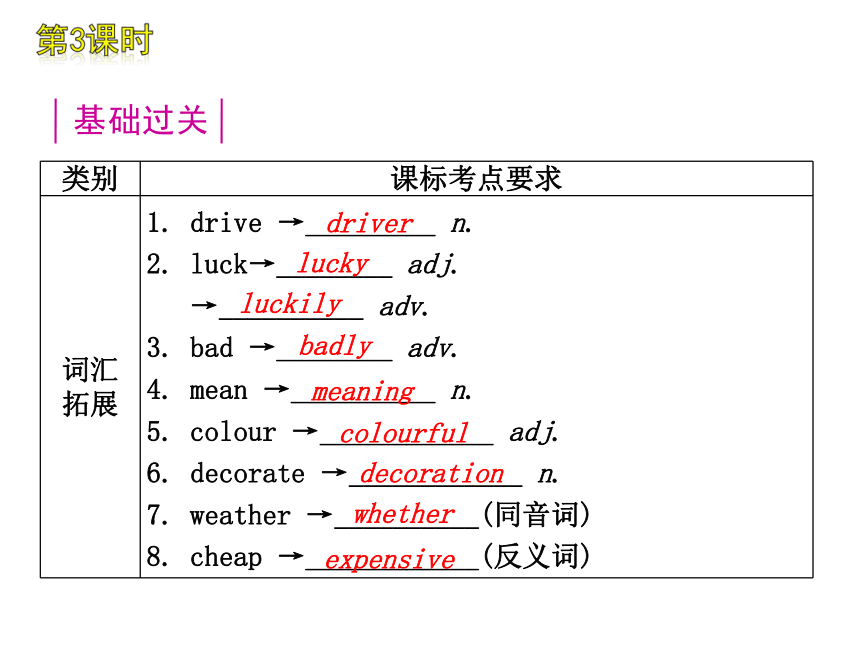
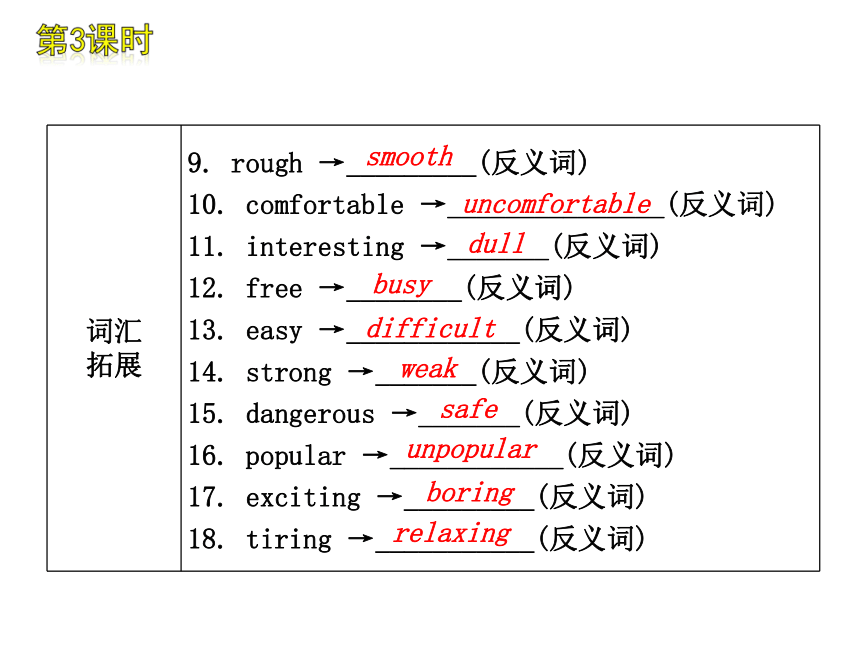
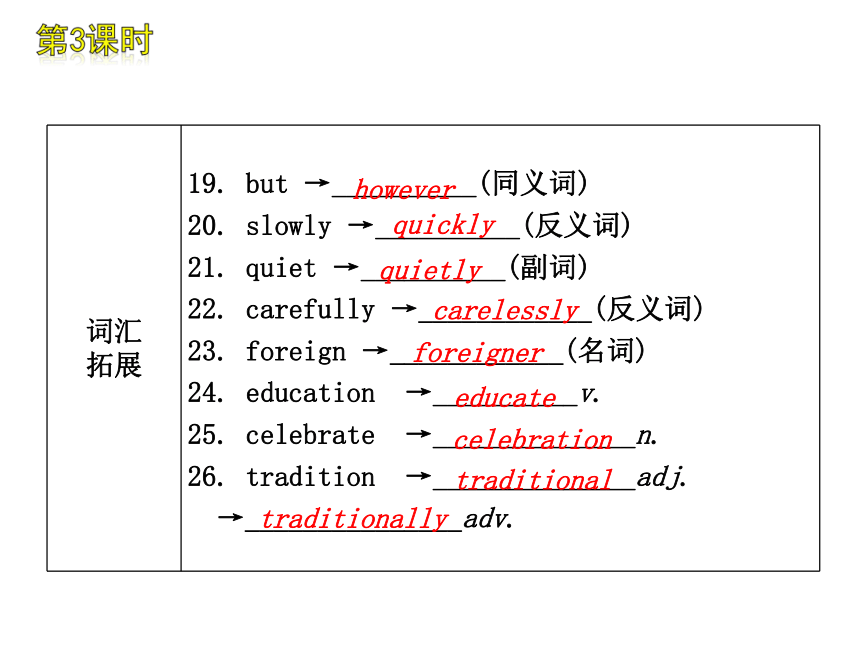

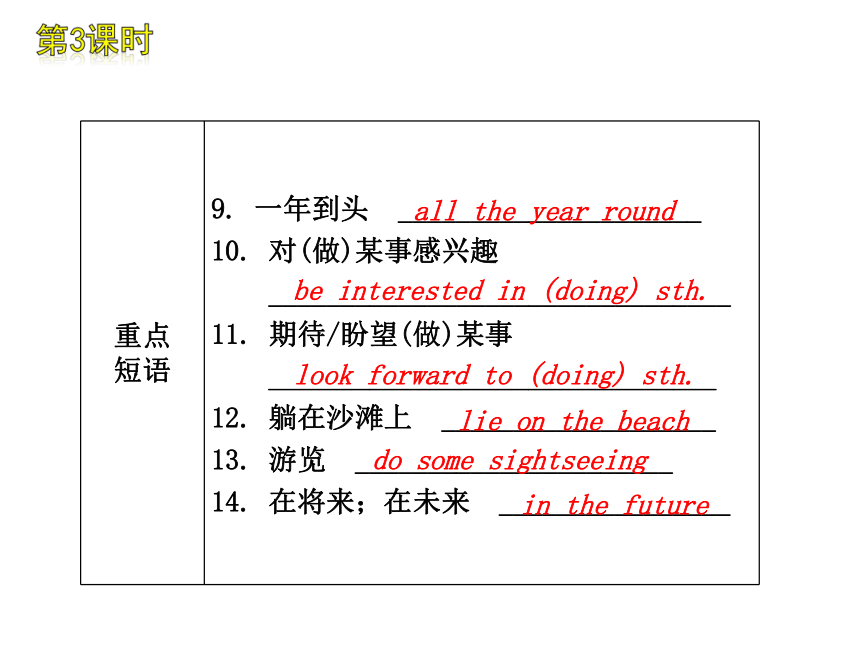
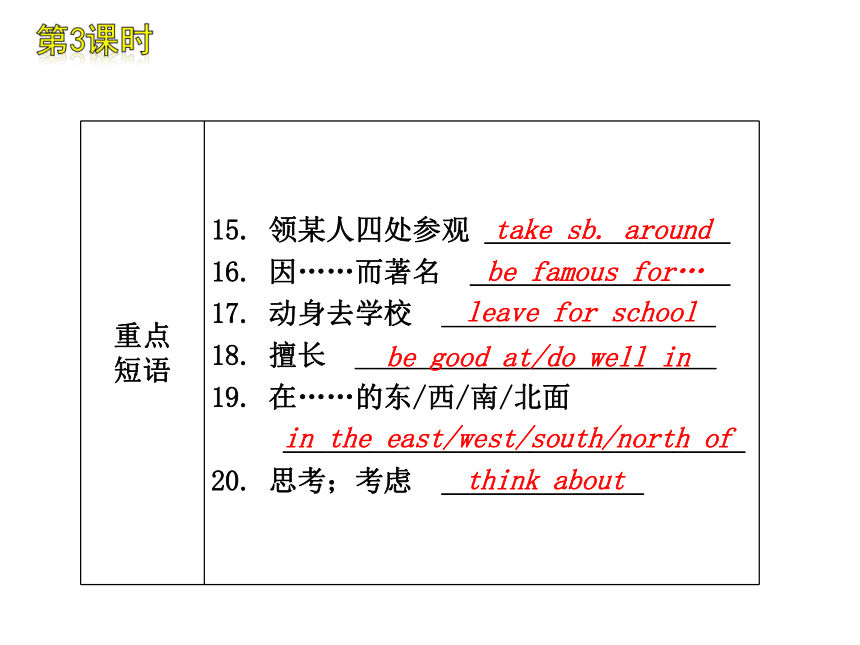
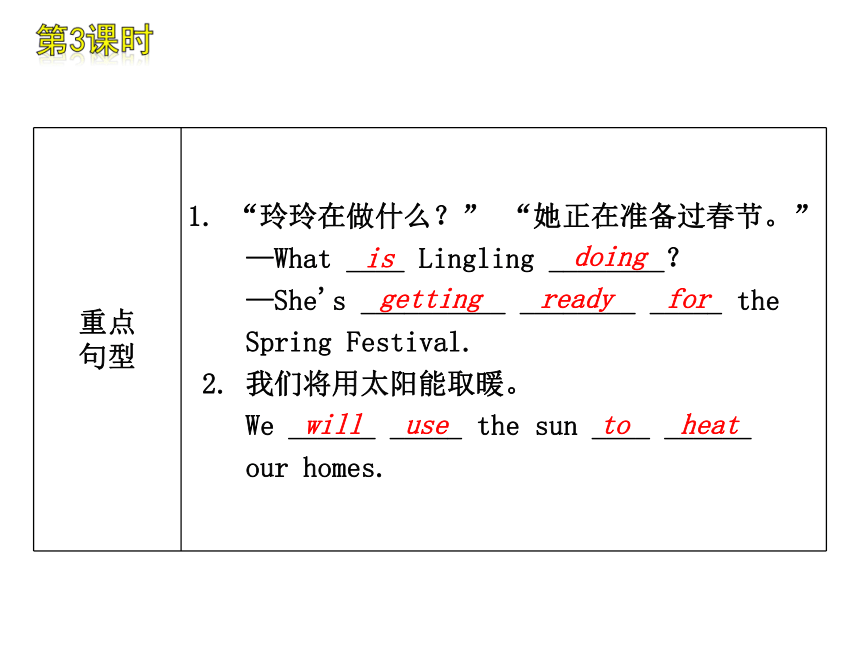


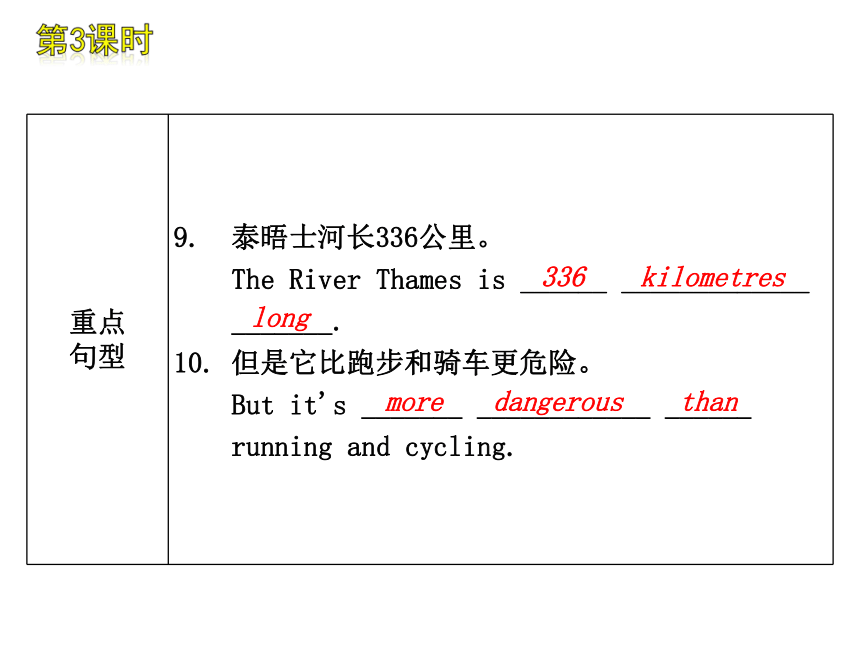
文档简介
(共52张PPT)
2012版中考一轮复习精品课件
外研版
含2011中考真题
·外研版(衔接)
基础过关
·外研版(衔接)
类别 课标考点要求
词汇
拓展 1. drive →_________ n.
2. luck→________ adj.
→__________ adv.
3. bad →________ adv.
4. mean →__________ n.
5. colour →____________ adj.
6. decorate →____________ n.
7. weather →__________(同音词)
8. cheap →____________(反义词)
driver
lucky
luckily
badly
meaning
colourful
decoration
whether
expensive
·外研版(衔接)
词汇
拓展 9. rough →_________(反义词)
fortable →_______________(反义词)
11. interesting →_______(反义词)
12. free →________(反义词)
13. easy →____________(反义词)
14. strong →_______(反义词)
15. dangerous →_______(反义词)
16. popular →____________(反义词)
17. exciting →_________(反义词)
18. tiring →___________(反义词)
smooth
uncomfortable
dull
busy
difficult
weak
safe
unpopular
boring
relaxing
·外研版(衔接)
词汇
拓展 19. but →__________(同义词)
20. slowly →__________(反义词)
21. quiet →__________(副词)
22. carefully →____________(反义词)
23. foreign →____________(名词)
24. education →__________v.
25. celebrate →______________n.
26. tradition →______________adj.
→_______________adv.
however
quickly
quietly
carelessly
foreigner
educate
celebration
traditional
traditionally
·外研版(衔接)
重点
短语 1. 拍照片 ______________
2. 玩得愉快 _________________________
__________________________
3. 穿上 _________
4. 等候 __________
5. 向某人道别 ____________________
6. 为……做好准备 ___________________
7. 用……装饰…… __________________
8. 理发 _________________
take photos
put on
wait for
say goodbye to sb.
get/be ready for…
decorate…with…
have a haircut
have a good time/have a
great time/enjoy oneself
·外研版(衔接)
重点
短语 9. 一年到头 _____________________
10. 对(做)某事感兴趣
________________________________
11. 期待/盼望(做)某事
_______________________________
12. 躺在沙滩上 ___________________
13. 游览 ______________________
14. 在将来;在未来 ________________
all the year round
lie on the beach
do some sightseeing
in the future
be interested in (doing) sth.
look forward to (doing) sth.
·外研版(衔接)
重点
短语 15. 领某人四处参观 _________________
16. 因……而著名 __________________
17. 动身去学校 ___________________
18. 擅长 _________________________
19. 在……的东/西/南/北面
________________________________
20. 思考;考虑 ______________
take sb. around
be famous for…
leave for school
be good at/do well in
in the east/west/south/north of
think about
·外研版(衔接)
重点
句型
1. “玲玲在做什么?” “她正在准备过春节。”
—What ____ Lingling ________?
—She's __________ ________ _____ the
Spring Festival.
2. 我们将用太阳能取暖。
We ______ _____ the sun ____ ______
our homes.
is
doing
getting
ready
for
will
use
to
heat
·外研版(衔接)
重点
句型 3. 我打算要早起。
I'm ____ _____ ________ ______ ________.
4. 我期待着能见到我的女儿和我女儿的女儿——
我的外孙女。
I'm _________ __________ _____ ________
my daughter and her daughter, my
granddaughter.
5. 将会有暴雨和大风。
______ ______ _____ _______ _______ and
________ ______.
going
to
get
up
early
looking
forward
to
seeing
There
will
be
heavy
rain
strong
wind
·外研版(衔接)
重点
句型 6. 人们将每周工作三天。
People will work ________ ______ ____
_______.
7. “上海有多少人口?” “我想有1300万人吧。”
—________ the population ____ Shanghai
—13 million people, I ________.
8. 剑桥在英格兰的东部。
Cambridge is ____ _____ ______ of England.
three
days
a
week
What's
of
think
in
the
east
·外研版(衔接)
重点
句型 9. 泰晤士河长336公里。
The River Thames is ______ _____________
_______.
10. 但是它比跑步和骑车更危险。
But it's _______ ____________ ______
running and cycling.
336
kilometres
long
more
dangerous
than
·外研版(衔接)
语法
结构 掌握现在进行时、一般将来时的构成及用法。
[详见P82,语法互动(九)]
2. 形容词和副词的比较级和最高级。[详见P76,
语法互动(六)]
·外研版(衔接)
词汇点睛
重点突破
1 call v.把……叫做,名为……;打电话
We call him “Tony Smith”.
我们叫他Tony Smith。
[点拨] 当call意为“打电话”时,后面可接人,也可以接电话号码。如:
I'll call her immediately. 我会马上打电话给她。
Please call 110. 请拨打110。
·外研版(衔接)
[拓展] (1) “给某人打电话”还可以表示为call sb. (up), give sb. a call, give sb. a ring等。
(2) call的过去分词called常在句中作定语,意为“叫做”。如:
There is a boy called Tony here.
这儿有一个叫Tony的男孩。
·外研版(衔接)
活学活用
请你随时打电话给我。
Please _______ me ____ ______ anytime.
give
a
call
·外研版(衔接)
2 help v.帮助
[点拨] help后跟动词不定式作宾语补足语,其不定式可以带to,也可以不带to,即help sb.(to) do sth.。
Can you help me (to) post the letter now
你可以帮我寄这封信吗?
·外研版(衔接)
[搭配] (1)help sb. with sth. 意为“帮助某人(做某事)”,后接名词。
I often help my sister with English on weekend.
周末我经常帮我妹妹学英语。
(2)help还可用于以下词组:
help oneself to 请随便吃(食物)
can't help doing sth. 禁不住做某事
·外研版(衔接)
活学活用
( ) (1)Let Jim ______ you ______ the housework.
A. help; on B. help; with
C. helps; for D. helps; with
( ) (2)[2010 ·巴中]Come on,children!Help
______ to some _______ .
A. yourself; meat
B. yourselves; chicken
C. yourselves; beefs
B
B
由children可知用yourselves, chicken, beef都是不可数名词。
·外研版(衔接)
3 lie v.躺下;位于;撒谎 n.谎言
[点拨] (1) lie 意为“平躺,平放”时,其现在分词、过去式、过去分词分别为lying, lay, lain;lie意为“说谎”时,其现在分词、过去式、过去分词分别为lying, lied, lied。
(2) lie作为名词常用于短语:tell a lie撒谎。如:
The boy often tells a lie, so we don't like him.
这男孩常撒谎,因此我们都不喜欢他。
·外研版(衔接)
活学活用
(1) Shanghai ______ (位于)in the east of China.
(2) Don't _____ _____ (对……撒谎)me, or nobody
will believe you.
lies
lie
to
·外研版(衔接)
4 take v.获得;拿;抓
[点拨] take的过去式是took, 过去分词是taken。
take作“拿走;带走”讲时,反义词是bring。如:
Miss Smith takes away the book.
Smith小姐拿走了那本书。
·外研版(衔接)
[拓展] take常见的词义还有:
(1) 吃;服(药)。 如:
Take the pills twice a day. 这些药一天服两次。
(2) 花费,常用于It takes sb. sometime to do sth.句型。如:
It takes half an hour to get to New York from here. 从这里到纽约花费半小时。
(3) 乘;坐。如:
We can take the plane to London.
我们可以坐飞机去伦敦。
·外研版(衔接)
(4) 买。如:
This pair of trainers is very nice. I'll take it.
这双运动鞋很漂亮,我买了。
[搭配] take a look看一看
take away拿走
take care当心
take care of照顾
take photos拍照
take part in 参加
take off脱下;起飞
·外研版(衔接)
活学活用
从take part in,take away,take off中选择适当的词
填空
The plane will ______ _____ at eight o'clock.
(2) The food smells sour. Could you please ______ it
_______?
(3) In order to win the competition, I must ______
_______ ____ the training.
take
off
take
away
take
part
in
·外研版(衔接)
5 get v.变得;得到;拿到
[点拨] (1) get作“变得;成为”讲时,后接形容词作表语,用作系动词。如:
The weather is getting warm.天气在逐渐变暖。
(2) get还意为“得到,拿到”。如:
I hope to get a letter from my mum.
我希望收到妈妈的信。
·外研版(衔接)
[拓展] (1) get作“使,让,说服”讲时,属于使役性动词,常用于固定搭配get sb. to do sth.中。如:
I'll get one of my guard to pick you up.
我会让我的一个保安去接你。
(2) get作“使……处于某种状态”时,后常接形容词作宾语补足语。如:
Don't get your shoes dirty.不要弄脏你的鞋子。
·外研版(衔接)
活学活用
( ) How can you get the poor girl ________
home to beg food outside
A. leaving B. to leave
C. left D. leaves
B
·外研版(衔接)
6 exciting adj.激动人心的
[点拨] (1)exciting 在句中作表语时,用来描述某一事物的特点。 如:
The programme for the weekend looks exciting.
周末的节目看起来很令人激动。
(2)exciting在句中还可以作名词的定语,表示主动性。如:
It will be the most exciting day in my life.
这将是我一生中最激动人心的一天。
·外研版(衔接)
[拓展] (1)excited作形容词,在句中通常是“人”作主语。常用于短语:be excited about 因……而兴奋。如:
Are you excited about going to Beijing
去北京你兴奋吗?
(2)excited在句中还可以作定语,表示被动性。如:
The excited children are opening their Christmas presents. 激动的孩子们正在打开他们的圣诞礼物。
注意:类似用法的单词还有:tiring/tired,
boring/bored, interesting/interested,
relaxing/relaxed, surprising/surprised等。
·外研版(衔接)
活学活用
( ) [2010·龙岩] My hobby is changing all the
time. Now I am ______ in collecting coins.
It's ________ and valuable.
A. interesting; interested
B. interested; interesting
C. interested; interest
B
·外研版(衔接)
7 happen 与take place
[辨析] (1)happen作“发生”讲,一般用于偶然或突发性事件,常用于句式:
sth. happened to sb. 某人发生某事。
What happened to you 你怎么了?
happen 还可以作“碰巧”讲。如:
I happened to see him on my way home.
= It happened that I saw him on my way home.
我在回家的路上碰巧遇见了他。
·外研版(衔接)
(2)take place 表示“发生、举行”,一般指非偶然性事件的“发生”,即这种事件的发生一定有某种原因或事先的安排。
Great changes have taken place in our hometown during the past ten years.
在过去的十年里,我们家乡发生了巨大变化。
[注意] happen 与 take place 通常都没有被动语态。
·外研版(衔接)
活学活用
The heavy earthquake ___________(happen/ take place) in Wenchuan on May 12, 2008.
happened
地震是偶然发生在2008年, 所以用过去happened。
·外研版(衔接)
8 in bed 与 on the bed
[辨析] (1) in bed (躺)在床上,主语一般都是人。
stay in bed 卧床休息 be ill in bed 卧病在床
(2) on the bed在床上,主语一般都是物。
·外研版(衔接)
活学活用
(1) 她昨天在床上躺了一整天。
She _________ ____ _____ the whole day
yesterday.
(2) 他的帽子在床上。
His hat is ____ _____ _____.
stayed
in
bed
on
the
bed
·外研版(衔接)
9 everyone 与 every one
[辨析] (1) everyone是代词,相当于everybody,是“每个人;人人;大家”的意思,不指具体哪一个人,且只能指人,不能指物,不能和of短语连用;作主语时,谓语动词用第三人称单数形式。如:
Everyone is here except David.
除大卫外大家都到了。
·外研版(衔接)
(2) every one既可指人,也可指物,指人时,强调“……中的每一个人”,且可以和of短语连用。如:
Every one/Everyone in our class likes playing basketball.
我们班人人喜欢打篮球。
There is something wrong with every one of the bikes.
每辆自行车都有毛病。
·外研版(衔接)
活学活用
( ) _______ us _______ got some information
about High School Examination.
A. Every one of; has
B. Everyone of; have
C. None; has
D. No one of; have
A
everyone, no one 都不能与of连用。
·外研版(衔接)
10 arrive, reach 与 get to
[点拨] 三者均表示“到达”,多数情况下可以通用,具体用法如下:
(1) arrive 为不及物动词, 与介词in(+大地点)或 at (+ 小地点)连用。如:
When do they arrive at the village
他们什么时候到村里?
(2) get 为不及物动词,后接to表示“到达”。如:
He gets to school at 7:00 every day.
他每天七点到校。
·外研版(衔接)
(3) reach 为及物动词,后面直接跟地点名词。如:
Please call me when you reach Shanghai.
你到了上海打电话给我。
活学活用
用get, reach或arrive的适当形式填空
(1) When does your pen friend ________ at the airport
(2) She ______ to the station at 6:00 yesterday.
(3) Please pay me a visit when you _______ Beijing.
arrive
got
reach
·外研版(衔接)
句型透视
1 Cambridge is in the east of England.
剑桥在英格兰的东部。
[点拨] in the east of 意为“位于……的东部”,指内部;on the east of 是“东与……相接”, to the east of 是“在……之东(不相接)”。如:
North Korea is on the east of China, in the east of Asia, to the west of Japan.
朝鲜在中国和亚洲东部,日本西部。
·外研版(衔接)
[辨析] in, on与to
in表示在某范围内,而且属于某范围。如:
Guilin is in the north of Guangxi.
(2) on表示两地接壤,但无归属关系。如:
Hunan Province is on the north of Guangxi
Province.
(3) to表示两地不接壤,而且无归属关系。如:
Beijing is to the north of Guangxi.
·外研版(衔接)
活学活用
( ) Japan is an island country. It isn't ______
the east of China. It is ________ the east of
China.
A. to; on B. on; in C. on; to
C
·外研版(衔接)
Dalian is in the north of China and it has a
population of 5.9 million people.
大连位于中国的北部,有590万人口。
[点拨] 表示某地区有多少人口时,要与of连用。其句式有两种:
The population of +某地+ is…;
某地 + has a population of… 如:
My hometown has a population of more than 1 million.
=The population of my hometown is more than 1 million. 我家乡有一百多万人。
·外研版(衔接)
活学活用
( ) ______ the population of your hometown
A. How B. What
C. How's D. What's
D
·外研版(衔接)
3 It's difficult to see and hear at the back.
在后面看见和听见是很困难的。
[点拨] It's +adj. + (of/ for sb.) to do sth.是固定句式,意为“(对某人来说)做某事怎么样。”
(1)It 是形式主语,不定式to do是真正主语,of/for sb.是不定式的逻辑主语。
·外研版(衔接)
(2)当形容词描述人的性格、品质、特征时介词用of,如:nice, kind, lovely, lazy, friendly等。如:
It's kind of you to help me. 很感谢你帮助我。
当形容词描述事物的性质、说明不定式的情况时,介词用for。
(3)其否定形式:It's +adj. + (of/ for sb.) not to do sth. 如:
It's necessary not to tell her it.
没必要告诉她这件事。
·外研版(衔接)
活学活用
( ) It's nice _______ you to spend so much time
showing me around your school.
A. for B. of C. to D. as
B
·外研版(衔接)
高频考点
( ) 1. John is 180 centimetres tall,and his
daughter is 90, so he is twice ________ she.
A. so tall as B. as tall as
C. much taller than D. less than
B
本题考查倍数的表达方式。表示“A是B的……倍时”, 用“A is +倍数+as+形容词原级+as+B”结构或用“A is +比较级+than+B”结构。
·外研版(衔接)
( ) 2. [2010·十堰]—Did you have a wonderful
time at the party
—Yes, it's________ one I've ever been to
before.
A. a more excited B. a more exciting
C. the most excited D. the most exciting
D
由句意可知应使用最高级, 句中one代替的是上文提到的party, 描述事物的特点用exciting。
·外研版(衔接)
( ) 3. [2011·河南]—What do you want to be in
the future, Nick
—I want to be ______ pilot. It is ______
exciting job.
A. a; a B. a; an
C. the; an D. a; the
B
“a+单数名词”泛指一类人或物。句意为:我想当一位飞行员,那是一份令人激动的工作。 job与pilot不是同一物,不要误以为后面是第二次提到而用the。
2012版中考一轮复习精品课件
外研版
含2011中考真题
·外研版(衔接)
基础过关
·外研版(衔接)
类别 课标考点要求
词汇
拓展 1. drive →_________ n.
2. luck→________ adj.
→__________ adv.
3. bad →________ adv.
4. mean →__________ n.
5. colour →____________ adj.
6. decorate →____________ n.
7. weather →__________(同音词)
8. cheap →____________(反义词)
driver
lucky
luckily
badly
meaning
colourful
decoration
whether
expensive
·外研版(衔接)
词汇
拓展 9. rough →_________(反义词)
fortable →_______________(反义词)
11. interesting →_______(反义词)
12. free →________(反义词)
13. easy →____________(反义词)
14. strong →_______(反义词)
15. dangerous →_______(反义词)
16. popular →____________(反义词)
17. exciting →_________(反义词)
18. tiring →___________(反义词)
smooth
uncomfortable
dull
busy
difficult
weak
safe
unpopular
boring
relaxing
·外研版(衔接)
词汇
拓展 19. but →__________(同义词)
20. slowly →__________(反义词)
21. quiet →__________(副词)
22. carefully →____________(反义词)
23. foreign →____________(名词)
24. education →__________v.
25. celebrate →______________n.
26. tradition →______________adj.
→_______________adv.
however
quickly
quietly
carelessly
foreigner
educate
celebration
traditional
traditionally
·外研版(衔接)
重点
短语 1. 拍照片 ______________
2. 玩得愉快 _________________________
__________________________
3. 穿上 _________
4. 等候 __________
5. 向某人道别 ____________________
6. 为……做好准备 ___________________
7. 用……装饰…… __________________
8. 理发 _________________
take photos
put on
wait for
say goodbye to sb.
get/be ready for…
decorate…with…
have a haircut
have a good time/have a
great time/enjoy oneself
·外研版(衔接)
重点
短语 9. 一年到头 _____________________
10. 对(做)某事感兴趣
________________________________
11. 期待/盼望(做)某事
_______________________________
12. 躺在沙滩上 ___________________
13. 游览 ______________________
14. 在将来;在未来 ________________
all the year round
lie on the beach
do some sightseeing
in the future
be interested in (doing) sth.
look forward to (doing) sth.
·外研版(衔接)
重点
短语 15. 领某人四处参观 _________________
16. 因……而著名 __________________
17. 动身去学校 ___________________
18. 擅长 _________________________
19. 在……的东/西/南/北面
________________________________
20. 思考;考虑 ______________
take sb. around
be famous for…
leave for school
be good at/do well in
in the east/west/south/north of
think about
·外研版(衔接)
重点
句型
1. “玲玲在做什么?” “她正在准备过春节。”
—What ____ Lingling ________?
—She's __________ ________ _____ the
Spring Festival.
2. 我们将用太阳能取暖。
We ______ _____ the sun ____ ______
our homes.
is
doing
getting
ready
for
will
use
to
heat
·外研版(衔接)
重点
句型 3. 我打算要早起。
I'm ____ _____ ________ ______ ________.
4. 我期待着能见到我的女儿和我女儿的女儿——
我的外孙女。
I'm _________ __________ _____ ________
my daughter and her daughter, my
granddaughter.
5. 将会有暴雨和大风。
______ ______ _____ _______ _______ and
________ ______.
going
to
get
up
early
looking
forward
to
seeing
There
will
be
heavy
rain
strong
wind
·外研版(衔接)
重点
句型 6. 人们将每周工作三天。
People will work ________ ______ ____
_______.
7. “上海有多少人口?” “我想有1300万人吧。”
—________ the population ____ Shanghai
—13 million people, I ________.
8. 剑桥在英格兰的东部。
Cambridge is ____ _____ ______ of England.
three
days
a
week
What's
of
think
in
the
east
·外研版(衔接)
重点
句型 9. 泰晤士河长336公里。
The River Thames is ______ _____________
_______.
10. 但是它比跑步和骑车更危险。
But it's _______ ____________ ______
running and cycling.
336
kilometres
long
more
dangerous
than
·外研版(衔接)
语法
结构 掌握现在进行时、一般将来时的构成及用法。
[详见P82,语法互动(九)]
2. 形容词和副词的比较级和最高级。[详见P76,
语法互动(六)]
·外研版(衔接)
词汇点睛
重点突破
1 call v.把……叫做,名为……;打电话
We call him “Tony Smith”.
我们叫他Tony Smith。
[点拨] 当call意为“打电话”时,后面可接人,也可以接电话号码。如:
I'll call her immediately. 我会马上打电话给她。
Please call 110. 请拨打110。
·外研版(衔接)
[拓展] (1) “给某人打电话”还可以表示为call sb. (up), give sb. a call, give sb. a ring等。
(2) call的过去分词called常在句中作定语,意为“叫做”。如:
There is a boy called Tony here.
这儿有一个叫Tony的男孩。
·外研版(衔接)
活学活用
请你随时打电话给我。
Please _______ me ____ ______ anytime.
give
a
call
·外研版(衔接)
2 help v.帮助
[点拨] help后跟动词不定式作宾语补足语,其不定式可以带to,也可以不带to,即help sb.(to) do sth.。
Can you help me (to) post the letter now
你可以帮我寄这封信吗?
·外研版(衔接)
[搭配] (1)help sb. with sth. 意为“帮助某人(做某事)”,后接名词。
I often help my sister with English on weekend.
周末我经常帮我妹妹学英语。
(2)help还可用于以下词组:
help oneself to 请随便吃(食物)
can't help doing sth. 禁不住做某事
·外研版(衔接)
活学活用
( ) (1)Let Jim ______ you ______ the housework.
A. help; on B. help; with
C. helps; for D. helps; with
( ) (2)[2010 ·巴中]Come on,children!Help
______ to some _______ .
A. yourself; meat
B. yourselves; chicken
C. yourselves; beefs
B
B
由children可知用yourselves, chicken, beef都是不可数名词。
·外研版(衔接)
3 lie v.躺下;位于;撒谎 n.谎言
[点拨] (1) lie 意为“平躺,平放”时,其现在分词、过去式、过去分词分别为lying, lay, lain;lie意为“说谎”时,其现在分词、过去式、过去分词分别为lying, lied, lied。
(2) lie作为名词常用于短语:tell a lie撒谎。如:
The boy often tells a lie, so we don't like him.
这男孩常撒谎,因此我们都不喜欢他。
·外研版(衔接)
活学活用
(1) Shanghai ______ (位于)in the east of China.
(2) Don't _____ _____ (对……撒谎)me, or nobody
will believe you.
lies
lie
to
·外研版(衔接)
4 take v.获得;拿;抓
[点拨] take的过去式是took, 过去分词是taken。
take作“拿走;带走”讲时,反义词是bring。如:
Miss Smith takes away the book.
Smith小姐拿走了那本书。
·外研版(衔接)
[拓展] take常见的词义还有:
(1) 吃;服(药)。 如:
Take the pills twice a day. 这些药一天服两次。
(2) 花费,常用于It takes sb. sometime to do sth.句型。如:
It takes half an hour to get to New York from here. 从这里到纽约花费半小时。
(3) 乘;坐。如:
We can take the plane to London.
我们可以坐飞机去伦敦。
·外研版(衔接)
(4) 买。如:
This pair of trainers is very nice. I'll take it.
这双运动鞋很漂亮,我买了。
[搭配] take a look看一看
take away拿走
take care当心
take care of照顾
take photos拍照
take part in 参加
take off脱下;起飞
·外研版(衔接)
活学活用
从take part in,take away,take off中选择适当的词
填空
The plane will ______ _____ at eight o'clock.
(2) The food smells sour. Could you please ______ it
_______?
(3) In order to win the competition, I must ______
_______ ____ the training.
take
off
take
away
take
part
in
·外研版(衔接)
5 get v.变得;得到;拿到
[点拨] (1) get作“变得;成为”讲时,后接形容词作表语,用作系动词。如:
The weather is getting warm.天气在逐渐变暖。
(2) get还意为“得到,拿到”。如:
I hope to get a letter from my mum.
我希望收到妈妈的信。
·外研版(衔接)
[拓展] (1) get作“使,让,说服”讲时,属于使役性动词,常用于固定搭配get sb. to do sth.中。如:
I'll get one of my guard to pick you up.
我会让我的一个保安去接你。
(2) get作“使……处于某种状态”时,后常接形容词作宾语补足语。如:
Don't get your shoes dirty.不要弄脏你的鞋子。
·外研版(衔接)
活学活用
( ) How can you get the poor girl ________
home to beg food outside
A. leaving B. to leave
C. left D. leaves
B
·外研版(衔接)
6 exciting adj.激动人心的
[点拨] (1)exciting 在句中作表语时,用来描述某一事物的特点。 如:
The programme for the weekend looks exciting.
周末的节目看起来很令人激动。
(2)exciting在句中还可以作名词的定语,表示主动性。如:
It will be the most exciting day in my life.
这将是我一生中最激动人心的一天。
·外研版(衔接)
[拓展] (1)excited作形容词,在句中通常是“人”作主语。常用于短语:be excited about 因……而兴奋。如:
Are you excited about going to Beijing
去北京你兴奋吗?
(2)excited在句中还可以作定语,表示被动性。如:
The excited children are opening their Christmas presents. 激动的孩子们正在打开他们的圣诞礼物。
注意:类似用法的单词还有:tiring/tired,
boring/bored, interesting/interested,
relaxing/relaxed, surprising/surprised等。
·外研版(衔接)
活学活用
( ) [2010·龙岩] My hobby is changing all the
time. Now I am ______ in collecting coins.
It's ________ and valuable.
A. interesting; interested
B. interested; interesting
C. interested; interest
B
·外研版(衔接)
7 happen 与take place
[辨析] (1)happen作“发生”讲,一般用于偶然或突发性事件,常用于句式:
sth. happened to sb. 某人发生某事。
What happened to you 你怎么了?
happen 还可以作“碰巧”讲。如:
I happened to see him on my way home.
= It happened that I saw him on my way home.
我在回家的路上碰巧遇见了他。
·外研版(衔接)
(2)take place 表示“发生、举行”,一般指非偶然性事件的“发生”,即这种事件的发生一定有某种原因或事先的安排。
Great changes have taken place in our hometown during the past ten years.
在过去的十年里,我们家乡发生了巨大变化。
[注意] happen 与 take place 通常都没有被动语态。
·外研版(衔接)
活学活用
The heavy earthquake ___________(happen/ take place) in Wenchuan on May 12, 2008.
happened
地震是偶然发生在2008年, 所以用过去happened。
·外研版(衔接)
8 in bed 与 on the bed
[辨析] (1) in bed (躺)在床上,主语一般都是人。
stay in bed 卧床休息 be ill in bed 卧病在床
(2) on the bed在床上,主语一般都是物。
·外研版(衔接)
活学活用
(1) 她昨天在床上躺了一整天。
She _________ ____ _____ the whole day
yesterday.
(2) 他的帽子在床上。
His hat is ____ _____ _____.
stayed
in
bed
on
the
bed
·外研版(衔接)
9 everyone 与 every one
[辨析] (1) everyone是代词,相当于everybody,是“每个人;人人;大家”的意思,不指具体哪一个人,且只能指人,不能指物,不能和of短语连用;作主语时,谓语动词用第三人称单数形式。如:
Everyone is here except David.
除大卫外大家都到了。
·外研版(衔接)
(2) every one既可指人,也可指物,指人时,强调“……中的每一个人”,且可以和of短语连用。如:
Every one/Everyone in our class likes playing basketball.
我们班人人喜欢打篮球。
There is something wrong with every one of the bikes.
每辆自行车都有毛病。
·外研版(衔接)
活学活用
( ) _______ us _______ got some information
about High School Examination.
A. Every one of; has
B. Everyone of; have
C. None; has
D. No one of; have
A
everyone, no one 都不能与of连用。
·外研版(衔接)
10 arrive, reach 与 get to
[点拨] 三者均表示“到达”,多数情况下可以通用,具体用法如下:
(1) arrive 为不及物动词, 与介词in(+大地点)或 at (+ 小地点)连用。如:
When do they arrive at the village
他们什么时候到村里?
(2) get 为不及物动词,后接to表示“到达”。如:
He gets to school at 7:00 every day.
他每天七点到校。
·外研版(衔接)
(3) reach 为及物动词,后面直接跟地点名词。如:
Please call me when you reach Shanghai.
你到了上海打电话给我。
活学活用
用get, reach或arrive的适当形式填空
(1) When does your pen friend ________ at the airport
(2) She ______ to the station at 6:00 yesterday.
(3) Please pay me a visit when you _______ Beijing.
arrive
got
reach
·外研版(衔接)
句型透视
1 Cambridge is in the east of England.
剑桥在英格兰的东部。
[点拨] in the east of 意为“位于……的东部”,指内部;on the east of 是“东与……相接”, to the east of 是“在……之东(不相接)”。如:
North Korea is on the east of China, in the east of Asia, to the west of Japan.
朝鲜在中国和亚洲东部,日本西部。
·外研版(衔接)
[辨析] in, on与to
in表示在某范围内,而且属于某范围。如:
Guilin is in the north of Guangxi.
(2) on表示两地接壤,但无归属关系。如:
Hunan Province is on the north of Guangxi
Province.
(3) to表示两地不接壤,而且无归属关系。如:
Beijing is to the north of Guangxi.
·外研版(衔接)
活学活用
( ) Japan is an island country. It isn't ______
the east of China. It is ________ the east of
China.
A. to; on B. on; in C. on; to
C
·外研版(衔接)
Dalian is in the north of China and it has a
population of 5.9 million people.
大连位于中国的北部,有590万人口。
[点拨] 表示某地区有多少人口时,要与of连用。其句式有两种:
The population of +某地+ is…;
某地 + has a population of… 如:
My hometown has a population of more than 1 million.
=The population of my hometown is more than 1 million. 我家乡有一百多万人。
·外研版(衔接)
活学活用
( ) ______ the population of your hometown
A. How B. What
C. How's D. What's
D
·外研版(衔接)
3 It's difficult to see and hear at the back.
在后面看见和听见是很困难的。
[点拨] It's +adj. + (of/ for sb.) to do sth.是固定句式,意为“(对某人来说)做某事怎么样。”
(1)It 是形式主语,不定式to do是真正主语,of/for sb.是不定式的逻辑主语。
·外研版(衔接)
(2)当形容词描述人的性格、品质、特征时介词用of,如:nice, kind, lovely, lazy, friendly等。如:
It's kind of you to help me. 很感谢你帮助我。
当形容词描述事物的性质、说明不定式的情况时,介词用for。
(3)其否定形式:It's +adj. + (of/ for sb.) not to do sth. 如:
It's necessary not to tell her it.
没必要告诉她这件事。
·外研版(衔接)
活学活用
( ) It's nice _______ you to spend so much time
showing me around your school.
A. for B. of C. to D. as
B
·外研版(衔接)
高频考点
( ) 1. John is 180 centimetres tall,and his
daughter is 90, so he is twice ________ she.
A. so tall as B. as tall as
C. much taller than D. less than
B
本题考查倍数的表达方式。表示“A是B的……倍时”, 用“A is +倍数+as+形容词原级+as+B”结构或用“A is +比较级+than+B”结构。
·外研版(衔接)
( ) 2. [2010·十堰]—Did you have a wonderful
time at the party
—Yes, it's________ one I've ever been to
before.
A. a more excited B. a more exciting
C. the most excited D. the most exciting
D
由句意可知应使用最高级, 句中one代替的是上文提到的party, 描述事物的特点用exciting。
·外研版(衔接)
( ) 3. [2011·河南]—What do you want to be in
the future, Nick
—I want to be ______ pilot. It is ______
exciting job.
A. a; a B. a; an
C. the; an D. a; the
B
“a+单数名词”泛指一类人或物。句意为:我想当一位飞行员,那是一份令人激动的工作。 job与pilot不是同一物,不要误以为后面是第二次提到而用the。
